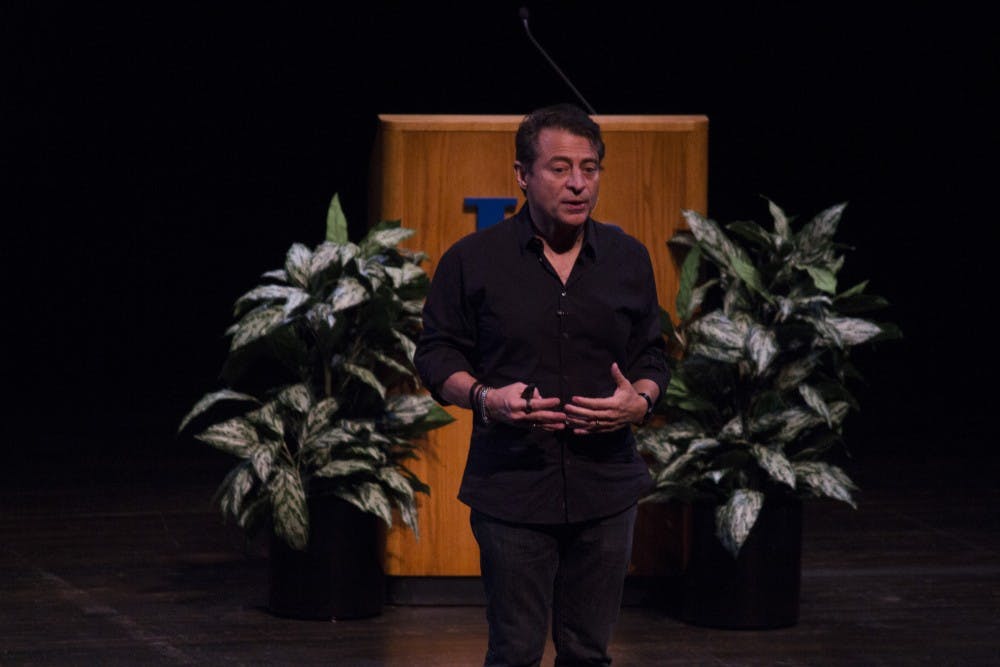Peter Diamandis predicts the future won’t include cars, rather spaceships and artificial intelligence.
Robot servants will be a part of everyday life, allowing humans to focus more on their passions, according to Diamandis. And with new technology, Diamandis said humans will be able to live comfortably over 100 years.
Diamandis’ lecture at the Center for the Arts on Wednesday night was part of UB’s 32nd Annual Distinguished Speakers Series. Although his address was targeted to a primarily older audience, his lecture highlighted developing technologies, such as artificial intelligence, human longevity and projections for creating an abundance of resources in the next decade. Diamandis offered his knowledge, followed by jabs of humor to the crowd of approximately 1,000 people.
He opened his speech by thanking UB for inviting him.
“Thank you for this chance to share what I’m passionate about, what I love in life and to perhaps give you a vision of the future that isn’t what you get on CNN or Fox News,” he said. “And if you thought things were moving fast, hold on, they’re about to get a lot faster.”
DIamandis’ presentation, titled “The Power and Implications of Exponential Change,” emphasized that although the future is full of the unknown and is rapidly approaching, it will be “extraordinary.”
One innovation that ensures this, according to Diamandis, is artificial intelligence. He said Google’s CEO described AI as more important to humanity than fire or electricity.
“And I believe him,” he said. “AI is going to change everything. [It will] transform our abilities to transform the world and be our greatest tool for solving humanity’s challenges.”
Diamandis provided successful examples of AI, including Google’s AlphaGo, Face++, Autodesk’s empathic digital human Ava and Deep Fake, an AI-generated video.
He predicts that using these forms of AI, we will achieve a brain-computer interface that he said would make the world faster and more efficient.
“Imagine in the future … you're walking toward the front door, your AI knows your schedule and as you open the door, it has had two autonomous Ubers circling the block and one pulls in,” he said. “And it knows with the data from your aura ring that you didn’t sleep much last night, so it ordered one that has a bed in the back seat so you can take a nap.”
Abigail Snyder, a Ph.D. student in chemistry said she’s excited to see Diamandis’ predictions happen.
“We’re the first generation of people to have grown up with the internet and that was a huge change,” she said. “So we’re seeing it now.”
One of Diamandis’ main talking points was human longevity, with an emphasis on “making 100 the new 60.”
He created two businesses, Human Longevity, Inc. and Celularity, to explore the possibility of extending the human lifespan. These companies use technology involving the human genome to rejuvenate cells, examine and alter DNA.
In doing this, he intends to extend the life of the human brain and the functionality of the body.
Diamandis said the Earth doesn’t lack resources, but humans lack the technology to harness them.
The Earth is covered in undrinkable water and sunlight that isn’t being converted to usable energy, Diamandis said. Resources will be plentiful once the technologies can transform Earth’s energy into assets, according to Diamandis.
“Things that used to be scarce are becoming more and more abundant,” he said. “In fact, eventually there will be nothing scarce, the idea of scarcity will be a thing of the past.”
Diamandis created the XPRIZE Foundation to assist in solving “humanity’s problems.” The foundation poses million-dollar prizes to any team that can solve the Diamandis’ initiatives.
Current competitions include initiatives to create AI that can educate, software to accurately diagnose illnesses and technology to create drinking water from water in the atmosphere.
Kaile Cato, a sophomore economics major, said Diamandis’ speech helped her have a better understanding of how technology works.
“Technology was never an interest of mine –– I actually despised it a lot,” she said. “But after coming to this and the information that he shared, I was able to get a clear understanding of how important [technology] is for our future. It’s not a threat, it’s something that we can work with instead of being afraid of.”
Diamandis said the most important thing to do in life is to “find your passion.”
“You need to figure out what you’re passionate about,” he said.
“Leadership is around passion –– it’s around people who have a vision of where we can go and how we can solve problems.”
Jacklyn Walters is the asst. news editor and can be reached at news@ubspectrum.com

Jacklyn Walters is a senior communication major and The Spectrum's managing editor. She enjoys bringing up politics at the dinner table and seeing dogs on campus.





